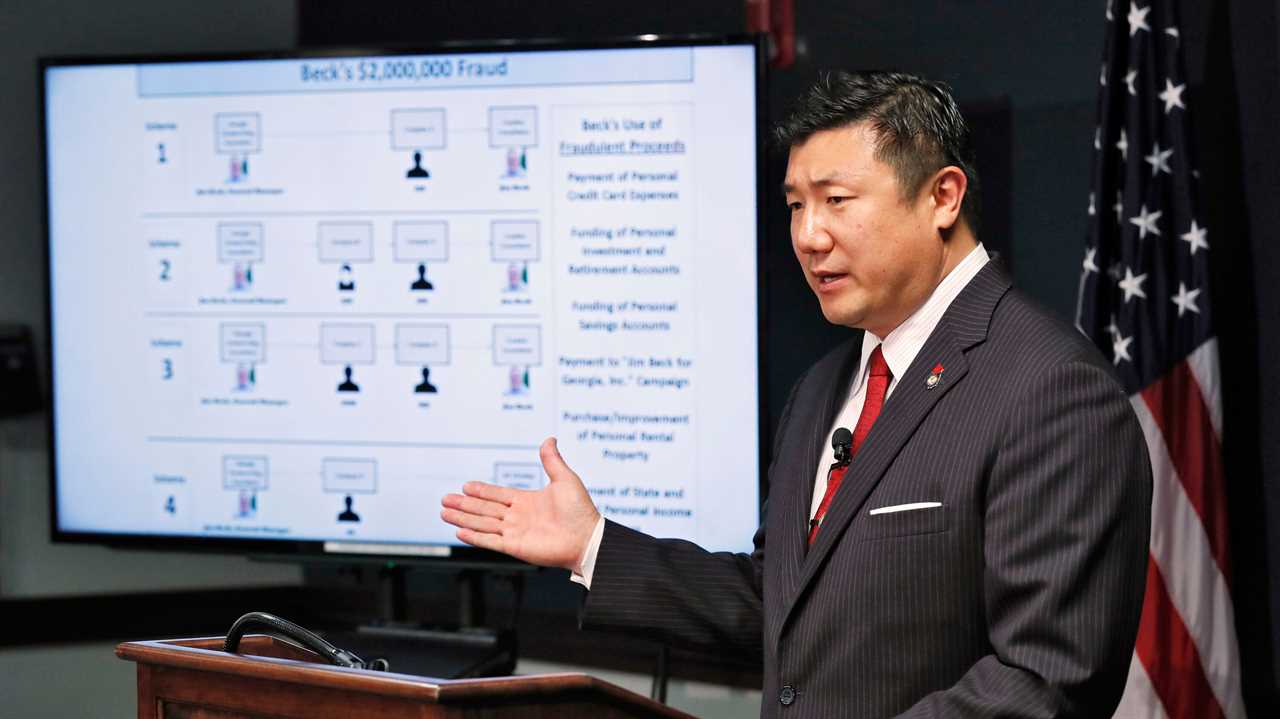
Byung J. Pak, a former U.S. attorney in Atlanta, told congressional investigators on Wednesday that his abrupt resignation in January had been prompted by Justice Department officials’ warning that President Donald J. Trump intended to fire him for refusing to say that widespread voter fraud had been found in Georgia, according to a person familiar with his testimony.
Mr. Pak, who provided more than three hours of closed-door testimony to the Senate Judiciary Committee, stepped down with no notice on Jan. 4, saying that he had done his best “to be thoughtful and consistent, and to provide justice for my fellow citizens in a fair, effective and efficient manner.”
While he did not discuss Mr. Trump’s role in his decision to resign at the time, he told the Senate panel that the president had been dismayed that Mr. Pak had investigated allegations of voter fraud in Fulton County, Ga., and not found evidence to support them, according to the person familiar with the statements.
Mr. Pak testified that top department officials had made clear that Mr. Trump intended to fire him over his refusal to say that the results in Georgia had been undermined by voter fraud, the person said. Resigning would pre-empt a public dismissal.
He also described work done by state officials and the F.B.I. to vet Mr. Trump’s claims of voter fraud, and said they had not found evidence to support those allegations.
The Senate Judiciary Committee is examining Mr. Pak’s departure as part of its broader investigation into the final weeks of the Trump administration and the White House’s efforts to pressure the Justice Department to falsely assert that the election was corrupt. The Justice Department’s inspector general is also looking at Mr. Pak’s resignation.
During a phone call with Secretary of State Brad Raffensperger of Georgia on Jan. 2, two days before Mr. Pak resigned, Mr. Trump asked Mr. Raffensperger to find enough votes to reverse the state’s presidential election results and described fraud allegations that Mr. Raffensperger said were not supported by facts, according to leaked audio of the call.
Mr. Pak had refused to support similar election fraud claims because of the lack of evidence, according to two people familiar with his investigation. “You have your never-Trumper U.S. attorney there,” Mr. Trump told Mr. Raffensperger during their phone call.
Audio of that call was leaked to The Washington Post on Sunday, Jan. 3, just hours before Mr. Trump met with top Justice Department officials to discuss the possibility of replacing the acting attorney general, Jeffrey A. Rosen, with Jeffrey Clark, a department leader who was willing to falsely tell Georgia officials that fraud might have affected the election outcome.
While Mr. Rosen and Mr. Clark argued at the meeting about which man should lead the Justice Department and whether the department should intervene in Georgia, Mr. Trump interjected with complaints about the department’s official conclusion that the state election results were valid, according to three people briefed on the meeting. Mr. Trump ultimately decided not to elevate Mr. Clark, and the department did not send Georgia officials a letter seeking to undermine Mr. Biden’s win.
Immediately after the Sunday evening meeting in the Oval Office, the Justice Department’s No. 2 official, Richard P. Donoghue, sent an email to Mr. Pak at 10:09 p.m. that said, “Please call ASAP,” according to documents that the House Oversight and Reform Committee obtained from the Justice Department and released in June.
Trump’s Bid to Subvert the Election
A monthslong campaign. During his last days in office, President Donald J. Trump and his allies undertook an increasingly urgent effort to undermine the election results. That wide-ranging campaign included perpetuating false and thoroughly debunked claims of election fraud as well as pressing government officials for help.
During that phone call, Mr. Donoghue relayed that Mr. Trump remained fixated on the false notion that he had won Georgia, and said the president was angry that Mr. Pak did not support that conclusion, according to a person familiar with the call.
Early the next morning, Mr. Pak sent Mr. Donoghue resignation letters addressed to Mr. Trump and Mr. Rosen, effectively immediately.
Senator Richard Blumenthal, Democrat of Connecticut and a member of the Judiciary Committee, said on Wednesday that Mr. Pak had “answered all questions in a seemingly honest and candid way, and my impression is that he believes in the rule of law and that he stood up for it.”
Mr. Blumenthal and Senator Jon Ossoff, Democrat of Georgia, were among a handful of committee members who listened to all of Mr. Pak’s testimony.
While the panel’s investigation is ongoing, it has completed its first set of interviews. They included Mr. Pak, Mr. Donoghue and Mr. Rosen, who spoke with the committee for nearly seven hours and with the Justice Department’s inspector general for about two hours.
Mr. Clark has not said whether he will come in for an interview, and the committee has not indicated who else it wants to speak with. The Justice Department has said that it will not invoke executive privilege if former officials are asked to testify before congressional investigators.






